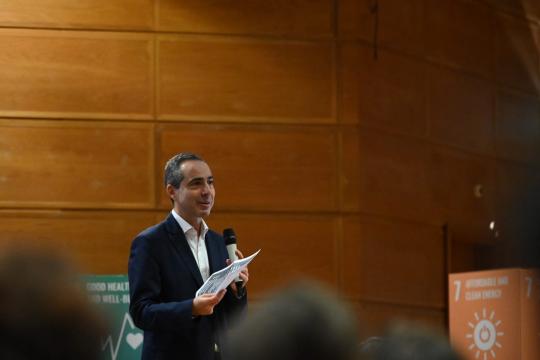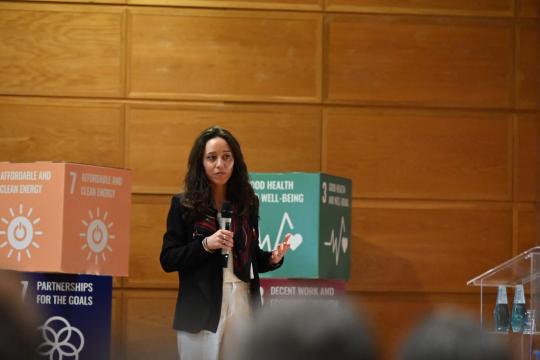On June 1, from 9 a.m. to 1 p.m., CATÓLICA-LISBON held the first public event on SDG Observatory in Portuguese companies, organized by the Center for Responsible Business & Leadership (CRB). The event was attended by around 200 participants and moved from theory to practice.
In 2015, the only universal agenda agreed upon by heads of state, businesses and social organizations around the world was adopted: the Sustainable Development Agenda, which consists of 17 goals. Right now, the world is in a crucial decade to accelerate the achievement of these goals. In this context, the SDG Observatory in Portuguese Companies and the SDG Meetings were launched: Beyond Theory" were launched. Watch the video here and learn more about this project.
In the opening session, Filipe Santos, Dean of CATÓLICA-LISBON, thanked the presence of so many people "on a Thursday morning", which shows the interest and importance of thinking and implementing the Sustainable Development Goals in all areas of society. The Dean of the Faculty assured that CATÓLICA-LISBON is "completely committed to the implementation of the SDGs and to helping companies in this very important journey. We know that we have to meet, by 2030, several goals. "We have to take into consideration that this is a 15-year challenge in which we all have to collaborate and we all have to move from theory to practice. Fulfilling this agenda means changing strategies, which is something very difficult, both nationally, internationally, and business-wise," reiterated the Dean of CATÓLICA-LISBON.

Filipa Pires de Almeida, Deputy Director of the CRB, then presented details about the Observatory and explained the objectives of the project:
- Knowledge production - clear knowledge about the commitment of Portuguese companies to the Sustainable Development Goals.
- Dissemination of case studies - presentation and dissemination of best practices in the implementation of the SDGs in the core area of corporate activity.
- Acceleration - a business fabric that is aware of the SDGs and contributes more actively to the sustainable development agenda in Portugal promotes their acceleration and implementation, moving from theory to practice.

In its first year of existence, the Observatory has produced a detailed report of more than 400 pages, divided into chapters so that it can be easily read according to interest, reflecting several interviews and analyses conducted with large and small companies in the Portuguese context in the different areas of the SDGs, contributing to a better vision of what we can do now. Because now is the time to act and drop the GAP between ambition and implementation. Now is the time to be concrete.
After the context on the state of the art of the Observatory, the audience could watch a video of André Moz Caldas, Secretary of State for the Presidency of the Council of Ministers, who, although he was not physically present, recorded his words and made it clear that "the fulfillment of the 2030 Agenda depends on our capacity, at all levels, to define and implement the actions and practices necessary to accelerate sustainable development in its three dimensions: economic, social and environmental (...) we cannot leave anyone behind, the planet belongs to all and, therefore, the responsibility belongs to all. Only together can we change the world.
Next, the audience listened to the speech by Paulo Areosa Feio, Director of Plan APP and responsible for coordinating the preparation of the Portuguese Government's Voluntary National Report on the Sustainable Development Goals, to be presented to the United Nations in July 2023. His intervention showed what progress the SDGs are currently making in Portugal, but, above all, he focused on the need to act. "We have to recognize that everyone, Government, Society, the whole world, has to do much more so that this Agenda is fulfilled and is something transformative (...) Commitment is the key word for us to see progress in the implementation of the 2030 Agenda". Although Portugal is statistically well positioned in the implementation of the SDGs, "we should not only be satisfied with these facts, but we should want and aspire more", says the speaker.
As the goal of this first event open to the public was to move from theory to practice, the nearly 200 participants were divided into four workshops in a moment of sharing, brainstorming and a practical challenge: to frame the best SDGs in a specific company, at the choice of each group. These were the four workshops that took place:
- Reporting, in partnership with PwC
- Compliance, in partnership with Deloitte
- Implementation of the SDG journey, in partnership with UN Global Compact Network Portugal
- Partnerships: how to create successful partnerships, with BCSD Portugal
At the end, a group from each workshop was chosen to debate the conclusions they reached, fulfilling the main goal of sharing ideas, best practices, and solutions for the implementation of the SDGs in the now!
The event continued with a round table, where we witnessed a conversation between managers of large companies and SMEs, namely with the intervention of Carolina Coelho, from the sustainability department of IKEA; Juliana Oliveira, CEO of OLIMEC and Rui Murteira, from Fábrica de Papel Ponte Redonda. The theme of the debate was about the future challenges of sustainability and the panel was moderated by Marta Bastos dos Santos, from GRACE - Responsible Business. The choice of including Carolina Coelho, from IKEA's Sustainability department, in the round table was based on the fact that the company has many SMEs in its value chain, with which it works closely and with which it maintains a good relationship, serving as inspiration for other companies, since IKEA has a well-established and structured sustainability policy.
The event ends with a speech by Nuno Moreira da Cruz, Executive Director of the Center for Responsible Business & Leadership, who thanked all the community present and extremely interested in the topic, which, admits the professor from CATÓLICA-LISBON, made him feel "the challenge and an added responsibility, and a responsibility that I will take on, to help make all this possible. To conclude, he launched a challenge to SMEs - which represent a large part of the Portuguese business fabric - "occupy your space. Large companies have to implement the SDGs in a mandatory way, but SMEs can still occupy their space, and, by their strength, they can even make a difference".
We have precisely seven years to change the world and achieve the goals that Agenda 2023 proposes. We count on everyone's help because no one will make this journey alone! The CATÓLICA-LISBON is deeply committed to being a driving force in this process of change.